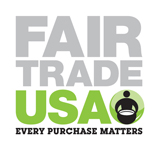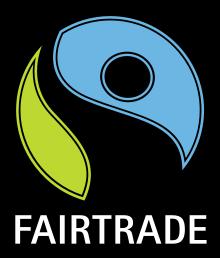
Fair trade is a term for an arrangement designed to help producers in developing countries achieve sustainable and equitable trade relationships. The fair trade movement combines the payment of higher prices to exporters with improved social and environmental standards. The movement focuses in particular on commodities, or products that are typically exported from developing countries to developed countries but is also used in domestic markets, most notably for handicrafts, coffee, cocoa, wine, sugar, fruit, flowers and gold.

Moshi is a municipality and the capital of Kilimanjaro region in the north eastern Tanzania. As of 2017, the municipality has an estimated population of 201,150 and a population density of 3,409 persons per km2. In the last official census of 2022, the municipality had a population of 221,733. The municipality is situated on the lower slopes of Mount Kilimanjaro, a dormant volcano that is the highest mountain in Africa. The name Moshi has been reported to refer to the smoke that emanates from the nearby mountain. The municipality covers about 59 square kilometres (23 sq mi) and is the smallest municipality in Tanzania by area.

The Fairtrade Foundation is a charity based in the United Kingdom that aims to help disadvantaged producers in developing countries by tackling injustice in conventional trade, in particular by promoting and licensing the Fairtrade Mark, a guarantee that products retailed in the UK have been produced in accordance with internationally agreed Fairtrade standards. The foundation is the British member of FLO International, which unites FLO-CERT, 25 National Fairtrade Organisations and 3 Producer Networks across Europe, Asia, Latin America, North America, Africa, Australia and New Zealand.

Maraba coffee is grown in the Maraba area of southern Rwanda. Maraba's coffee plants are the Bourbon variety of the Coffea arabica species and are grown on fertile volcanic soils on high-altitude hills. The fruit is handpicked, mostly during the rainy season between March and May, and brought to a washing station in Maraba, where the coffee beans are extracted and dried. At several stages, the beans are sorted according to quality. The farmers receive credits based on the amount and quality of the beans they provide.

The 'International Fairtrede Certification Mark is an independent certification mark used in over 69 countries. It appears on products as an independent guarantee that a product has been produced according to Fairtrade political standards.

Fair Trade USA, formerly "TransFair USA", is a 501(c)(3) non-profit organization that sets standards, certifies, and labels products that promote sustainable livelihoods for farmers and workers and protect the environment.

Equal Exchange is a for-profit, Fairtrade worker-owned cooperative headquartered in West Bridgewater, Massachusetts. Equal Exchange distributes organic, gourmet coffee, tea, sugar, bananas, avocados, cocoa, and chocolate bars produced by farmer cooperatives in Latin America, Africa, and Asia. Founded in 1986, it is the oldest and largest Fair Trade coffee company in the United States. The highest paid employee of Equal Exchange may not make more than four times what the lowest paid employee receives.

Fairtrade Canada, formerly TransFair Canada, is a national non-profit certification and public education organization promoting Fairtrade certified products in Canada to improve the livelihood of developing world farmers and workers. It is the Canadian member of FLO International, which unites 24 fair trade producer and certification initiatives across Europe, Asia, Latin America, North America, Africa, Australia and New Zealand.
The fair trade debate concerns the ethics and economic implications of fair trade, a term for an arrangement designed to help producers in developing countries achieve sustainable and equitable trade relationships. The benefits of fair trade for farmers and workers can vary considerably and the social transformation impacts also vary around the world. However the main concerns from critics is that fair trade may give an unfair advantage to some producers over others.
The Oromia Coffee Farmers’ Cooperative Union (OCFCU) is a smallholder farmer-owned cooperative union based in the Oromia region of Ethiopia. The aforementioned region is characterized by its unique native vegetation and tropical climate conducive to coffee bean growth. OCFCU is a democratic, member-owned business operating under the principles of the International Cooperative Alliance and Fair trade, and the Union plays a central role in the Ethiopian coffee marketing chain. The members of OCFCU grow, process, and supply organic Arabica coffee for export.
Uganda's favorable soil conditions and climate have contributed to the country's agricultural success. Most areas of Uganda have usually received plenty of rain. In some years, small areas of the southeast and southwest have averaged more than 150 millimeters per month. In the north, there is often a short dry season in December and January. Temperatures vary only a few degrees above or below 20 °C but are moderated by differences in altitude.

Fair trade coffee is coffee that is certified as having been produced to fair trade standards by fair trade organizations, which create trading partnerships that are based on dialogue, transparency and respect, with the goal of achieving greater equity in international trade. These partnerships contribute to sustainable development by offering better trading conditions to coffee bean farmers. Fair trade organizations support producers and sustainable environmental farming practices and prohibit child labor or forced labor.

A fair trade certification is a product certification within the market-based movement fair trade. The most widely used fair trade certification is FLO International's, the International Fairtrade Certification Mark, used in Europe, Africa, Asia, Australia and New Zealand. Fair Trade Certified Mark is the North American equivalent of the International Fairtrade Certification Mark. As of January 2011, there were more than 1,000 companies certified by FLO International's certification and a further 1,000 or so certified by other ethical and fairtrade certification schemes around the world.

The Union of Indigenous Communities of the Isthmus Region, is a farmer's cooperative in the state of Oaxaca, Mexico. It was established in 1982 to assist in production, marketing and distribution of locally produced coffee and other products. UCIRI was a pioneer of organic coffee production and one of the first fair trade suppliers.
Tadesse Meskela is the General Manager of the Oromia Coffee Farmers Cooperative Union of Ethiopia and was featured in the documentary Black Gold. He is a proponent of fair-trade, and speaks publicly in support of it around the world.

Coffee production in Tanzania is a significant aspect of its economy as it is Tanzania's largest export crop. Tanzanian coffee production averages between 30,000 and 40,000 metric tons annually of which approximately 70% is Arabica and 30% is Robusta.

Peace Coffee is an organization based in Minneapolis, Minnesota that sells organic, fair trade coffee. The company sells coffee through grocery, retail stores, food co-ops, and via the Internet. The organization operates throughout the United States with a strong presence in the Upper Midwest.
The cooperative movement in India plays a crucial role in the agricultural sector, banking and housing. The history of cooperatives in India is more than a hundred years old. Cooperatives developed very rapidly after Indian independence. According to an estimate, more than half a million cooperative societies are active in the country. Many cooperative societies, particularly in rural areas, increase political participation and are used as a stepping stone by aspiring politicians.

Agriculture is the main part of Tanzania's economy. As of 2016, Tanzania had over 44 million hectares of arable land with only 33 percent of this amount in cultivation. Almost 70 percent of the poor population live in rural areas, and almost all of them are involved in the farming sector. Land is a vital asset in ensuring food security, and among the nine main food crops in Tanzania are maize, sorghum, millet, rice, wheat, beans, cassava, potatoes, and bananas. The agricultural industry makes a large contribution to the country's foreign exchange earnings, with more than US$1 billion in earnings from cash crop exports.

Tanzania Mercantile Exchange is a commodity exchange in Tanzania. The commodities exchange is put in place to help various farmers access the domestic and global market better and obtain a fair price in selling of their produce. The exchange is currently undergoing training of their staff and is and has begun pilot trading in Sesame Seeds and Green Grams. The exchange plans to trade in coffee, cashew nuts, sesame, rice, sunflowers and maize, which are all currently traded under the warehouse receipt system. The Capital Market and Securities Authority (CMSA) currently oversees the operations of the exchange and is in the process of educating farmers to use the system, however, many farmers are skeptical to the system.













